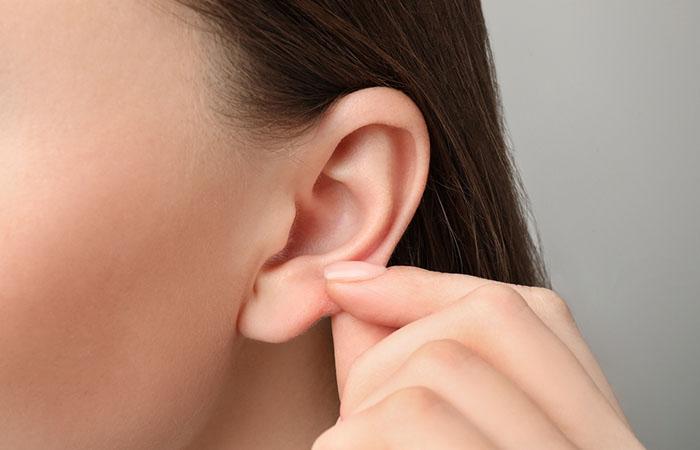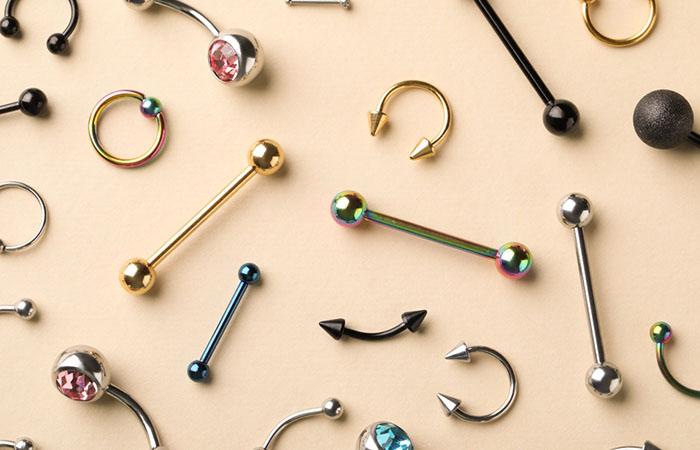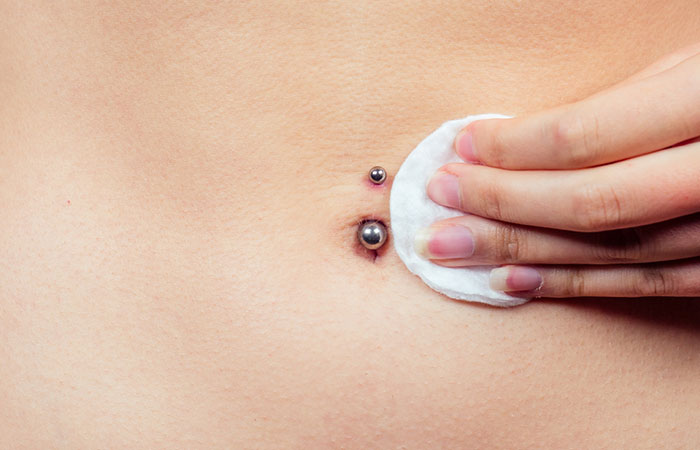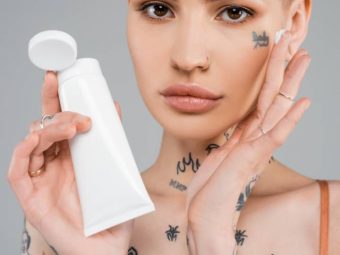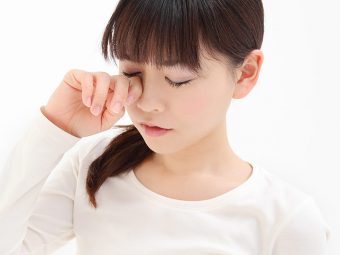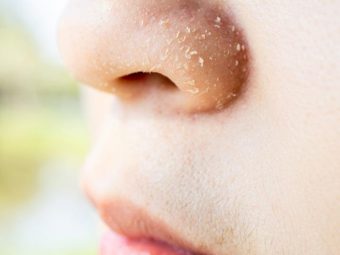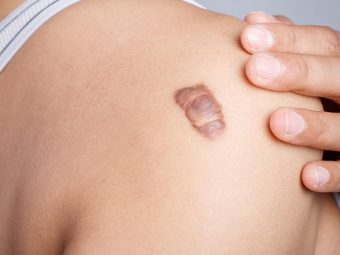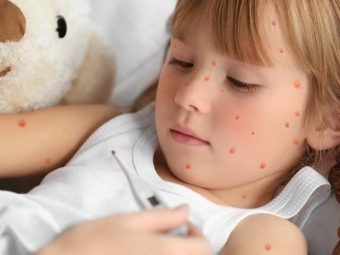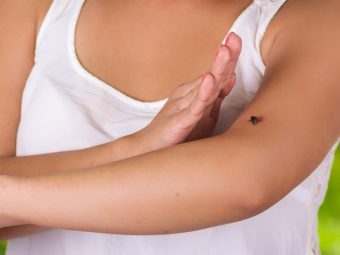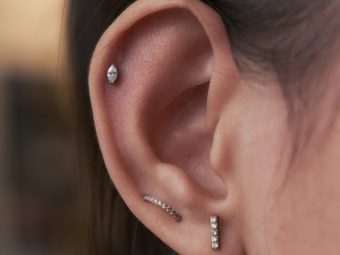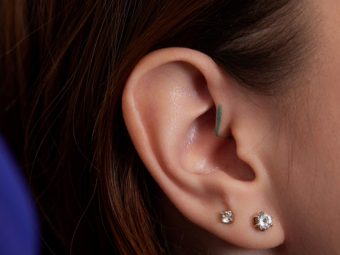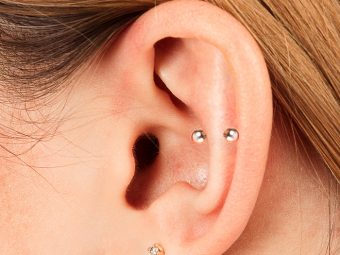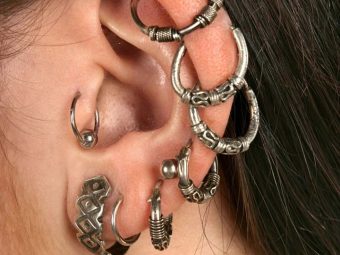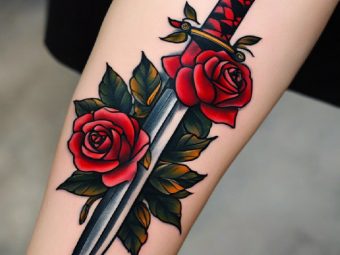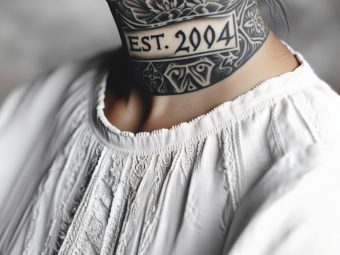Why Is My Piercing Itchy? How To Soothe And Aftercare Tips
Master piercing aftercare through effective tips to minimize itching and facilitate smooth healing!
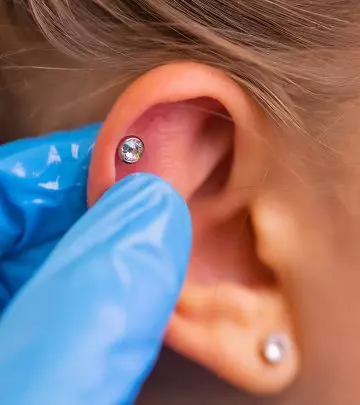
Image: Shutterstock
Whether you are a piercing veteran or new to the scene, experiencing sudden or intermittent itching can be bothersome. But fear not, as not all itchy piercings are a cause for concern. Various factors could cause this sensation of itching around a piercing site. While some include dry skin or irritation from jewelry, others could be underlying issues like infection or allergic reactions. In this article, we will dive deep into the many factors that may cause piercings to itch and explore practical solutions to alleviate discomfort. Continue reading to know more.
In This Article
Is It Normal For Piercings To Itch?
It is normal for piercings to itch as they heal. A piercing is basically an open wound, causing your body to go into overdrive to repair the tissue around the piercing site. This process can stimulate nerve endings, causing sensations of itching (1). It is usually nothing to worry about and is simply a sign that your body is working to heal the piercing.
However, you should pay attention to how your piercing is healing. If the itching is accompanied by excessive redness, swelling, warmth to the touch, or unusual discharge, it may be a sign of an infection or underlying medical issue that requires immediate attention (2). Infections are more likely to occur if proper aftercare instructions are not followed diligently.
It is essential to follow proper aftercare instructions provided by your piercer to minimize itching. If you are concerned about your piercing or if the itching persists or worsens, it is best to consult your piercer or a healthcare professional, as they can assess the situation and provide guidance on how to address any issues that may arise during and after the first healing process.
Piercings are not just about style; they help you make statements of self-expression, but they may become a concern if your piercings continue to itch persistently. Explore the common factors and underlying reasons behind an itchy piercing.
Why Is My Piercing Itchy?
There can be many reasons why your piercing is itchy. While some may be due to minor causes like weather changes or jewelry, others may suggest more serious concerns like health complications or infections. Explore the possible reasons behind your itchy piercing for effective care. Here are some common factors that may have been causing your pierced skin to itch:
1. Natural Healing Process
It is normal for your skin to feel itchy for the initial few weeks after getting a process (3). This is a part of the body’s natural healing process. During the healing process, a protective layer of skin is formed around the piercing that may cause itching. While scratching may seem like the solution, it is best to resist the urge. Scratching could upset the healing process or introduce germs.
2. Infections
One of the most common reasons for itchy piercings is an infection. Most, if not all, body piercings are prone to skin and soft tissue infections caused by microorganisms such as Staphylococcus, Streptococcus, Pseudomonas, Neisseria, and Chlamydia (4). Other more common symptoms include redness, swelling, tenderness, throbbing, a warm sensation, and drainage. Nasal and cartilage piercings are at a higher risk of infections compared to oral piercings. These infections can arise due to
- Unsterilized Tools: Amateur piercers may not follow the best safety practices, such as cleaning their tools and workspace thoroughly, leading to infections.
- Bad Piercing Aftercare: Not following the recommended aftercare tips, like cleaning the area twice daily and maintaining a good hygienic routine, provided by the piercer may result in an infection. Touching the pierced skin can also lead to bacteria build up.
- Over-Moisturization: While keeping the pierced skin moisturized helps it heal, too much moisture may lead to an infection. Too much moisture makes the skin a breeding ground for bacteria.
Kyra, a vlogger, shares her personal experience about an itchy piercing. She says, “This is nine times out of ten completely usual, this is a sign of your body healing… However, if you had a piercing for quite a long time and it’s itchy, it’s gonna happen after, maybe a little bit of trauma with your piercing, if it’s got ripped or caught on something, could be the start of an infection (i).” She added that the trauma may occur because of sleeping weirdly on the piercing.
Once the piercing gets infected it should be treated immediately to keep the healing process on track. An infected piercing left untreated for too long may cause further complications such as permanent scarring, discoloration, and other health issues.
3. Improper Jewelry Selection
Choosing the wrong jewelry for your piercing can turn the road to healing into an itchy journey. Opting for materials that trigger allergic reactions, like nickel, cobalt, or certain plastics, can lead to persistent itchiness and discomfort (5). Moreover, ill-fitting jewelry can irritate the piercing site, extending the healing process and intensifying the urge to scratch. It is essential to select high-quality, hypoallergenic materials, such as titanium, gold, niobium, platinum, glass, and surgical steel, to keep itchiness at bay and pave the way for a smoother healing experience (6). If you are unsure about which jewelry material to use, consult an experienced piercer beforehand.
 Pro Tip
Pro Tip4. Piercing Bumps Or Keloids
As you embark on your piercing healing journey, watch out for raised formations that may develop around the piercing site due to various factors like irritation, infection, or an overactive healing response (7). Not only can they be itchy, but they may also disrupt the healing process and cause discomfort.
Address these bumps promptly through proper aftercare and, if necessary, seeking guidance from a professional piercer or healthcare provider for smoother, itch-free healing.
5. Dryness

Dry skin around your piercing can trigger itching. It is essential to keep the area hydrated with a gentle, fragrance-free cream to prevent dryness and discomfort. Regular application of a water-based moisturizer helps keep the skin hydrated, reducing itching and promoting faster healing of the piercing.
 Quick Tip
Quick Tip6. Environmental Factors
Environmental factors play a significant role in the itchiness experienced around piercings. Changes in temperature, like sudden shifts from hot to cold or vice versa, can trigger itchiness by causing the skin to dry out or contract. Also, exposure to irritants like sweat can further exacerbate this sensation by accumulating around the piercing site, leading to increased moisture and potential irritation. Being mindful of these factors and taking preventive measures can help reduce itching and promote healing around your piercing.
7. Products Containing Harsh Additives
Using products containing harsh chemicals, alcohols, or added fragrances can further irritate the delicate skin around the piercing, leading to itching and discomfort (2). The products can strip the skin of its natural oils, leading to dryness and irritation. Fragrances and other additives may also contain allergens that can trigger allergic reactions in sensitive individuals, exacerbating the itching sensation. When caring for piercings, it’s essential to opt for gentle, hypoallergenic products specifically formulated for sensitive skin. These products can help maintain the skin’s natural balance, reducing the risk of itching and promoting a smoother healing process.
Delve into the piercing care routine to unlock its full potential. Remember that consistency is key, so prepare for a step-by-step guide to a healthy piercing experience!
How Do I Soothe An Itchy Piercing?
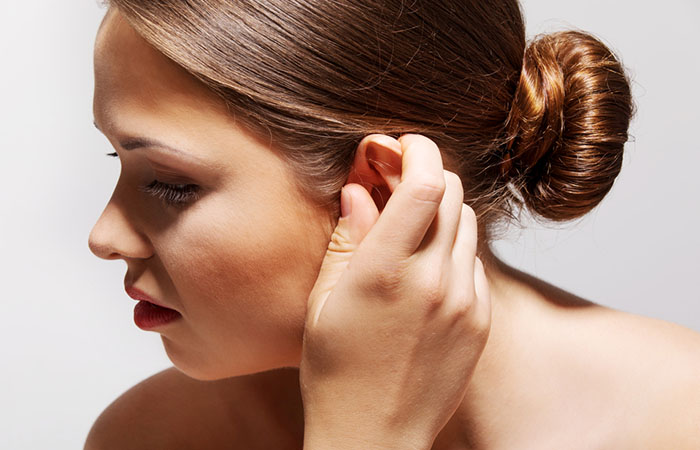
Here is a step-by-step guide to soothing an itchy piercing and ensuring a comfortable healing process:
- Cleanse With Care: Begin by gently cleaning the area around the piercing with a saline solution or mild soap and warm water to remove any buildup of debris or irritants that could be contributing to the itchiness. Kyra adds, “Try not to overclean your new piercing, obviously, especially just because it’s itchy. Just try to leave it alone and find a distraction.” She also recommends only twisting or touching the piercing jewelry during the cleaning process, not otherwise.
- Apply A Warm Compress: Ease itchiness and promote relaxation by applying a warm compress to the piercing site. You can use a clean cloth soaked in warm saline water or a chamomile tea bag for added soothing benefits (8), (9).
- Avoid Scratching: Resist the temptation to scratch the piercing, as this can aggravate irritation and prolong healing time. Instead, opt for gentle tapping or pressing around the area to relieve discomfort without causing further damage. Avoid touching the piercing at all unless you are cleaning it. Wash your hands with soap before cleaning your piercing, as dirty hands increase the risk of infections.
- Moisturize The Area: Keep the skin around the piercing hydrated and nourished by applying a fragrance-free, hypoallergenic moisturizer. This helps soothe dryness and reduce itchiness while supporting the healing process.
- Consider Anti-Itch Remedies: If itching persists, consider using over-the-counter anti-itch creams or hydrocortisone ointments as directed by your healthcare provider for temporary relief from itching and discomfort (10), (11).
- Seek Professional Advice: If itching persists or worsens despite your efforts, don’t hesitate to consult a professional piercer or healthcare provider to assess the situation and receive personalized advice or treatment options.
 Pro Tip
Pro TipFollowing these tips and using the recommended aftercare products as instructed by your piercer can help treat an itchy piercing quickly. The following section reveals if you can alleviate intermittent itching and heal the site effectively by using over-the-counter creams. Check it out!
Should I Use Over-The-Counter Creams For An Itchy Piercing?
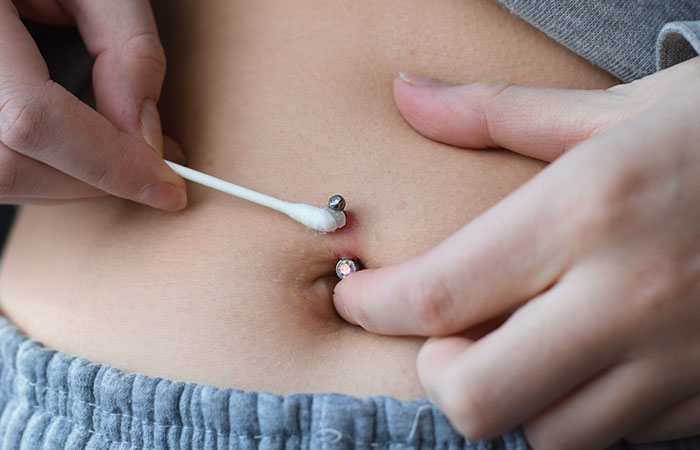
While over-the-counter creams can provide temporary relief, it is best to use them with caution. Opting for products specifically designed for sensitive skin and following the recommended instructions carefully can help avoid further irritation. Remember to consult a professional piercer or healthcare provider before using any new products to ensure they’re suitable for your situation. Also, these creams should complement rather than replace proper aftercare practices like gentle cleansing and moisturizing.
Here are some cases in which using an OTC product for itchy piercings is usually recommended by a physician:
- Mild Itching: If the itching is mild and there are no signs of infection like excessive redness, swelling, or discharge, OTC products can be used to alleviate discomfort.
- Allergic Reactions: Sometimes, itching around a piercing may be due to an allergic reaction to the jewelry material. In such cases, OTC antihistamines or anti-inflammatory creams can help reduce itching and inflammation.
- Dryness Or Irritation: Itching can also result from dryness or irritation around the piercing site. OTC moisturizing creams or saline solution can help soothe the skin and alleviate itching.
Your healthcare physician may recommend antibiotic ointments to manage minor infections. Here is a breakdown of some other OTC medications commonly used to soothe itchy piercings:
- Antihistamines: Oral antihistamines like loratadine (Claritin) or cetirizine (Zyrtec) can help relieve itching associated with allergic reactions (10).
- Hydrocortisone Cream: Over-the-counter hydrocortisone creams may help reduce inflammation and itching caused by irritation or allergic reactions (11). It should be applied sparingly and not directly into the piercing hole.
- Saline Solution: Saline solutions can help cleanse the piercing site and alleviate itching caused by dryness or irritation. It is essential to use sterile saline solution specifically formulated for wound care (8).
- Topical Numbing Agents: Some OTC topical numbing agents containing ingredients like benzocaine can provide temporary relief from itching and discomfort (13), (14). However, these agents must be used cautiously and sparingly, as they can sometimes cause further irritation.
- Topical Antiseptics: OTC topical antiseptics like povidone-iodine or benzalkonium chloride can help prevent infection and reduce itching associated with minor skin irritation around the piercing (15), (16).
Note: Seek medical attention. If the itching persists despite OTC treatment or is accompanied by other concerning symptoms like increased pain, redness, swelling, or discharge. In such cases, a healthcare professional may prescribe stronger medications or additional treatments to address any underlying issues.
Now that you know the OTC products you can use to treat an itchy piercing, learn some additional reliable tips that can help you even more!
Additional Aftercare Tips For An Itchy Piercing
Ditch the complicated aftercare routine and remember that hydration is your best friend! With the right approach, you can effectively alleviate discomfort and support the healing process of your piercing. Here are some additional aftercare tips for soothing an itchy piercing:
- Try chamomile compress, aloe vera ice cubes, witch hazel solution, or diluted tea tree oil for itchy piercings (9), (17), (18), (19). You may also use a probiotic yogurt mask to restore skin balance and alleviate itching .
- Stay out of pools, hot tubs, and natural water bodies like lakes or rivers until the piercing is fully healed to prevent exposure to bacteria and other contaminants.
- Opt for loose-fitting clothing that will not rub against or irritate the piercing. Avoid tight or restrictive clothing that can trap moisture and bacteria against the skin.
- Avoid using hydrogen peroxide to clean piercings as they dry out the skin and slow down the healing process.
- Apply sunscreen to protect your piercing from UV rays that may slow down the healing process and cause discoloration.
- Avoid physical activities to avoid bumping, pulling, or putting pressure on the piercing. Consider using protective gear or covering the piercing if necessary.
- Maintain a healthy diet rich in vitamins and nutrients to support the healing process. Avoid excessive alcohol consumption and smoking, as they can impair healing and increase the risk of complications.
- Ensure you get enough restful sleep each night to support your body’s natural healing processes. Avoid sleeping on the side of the piercing to prevent irritation.
- Do not discontinue using the prescribed medication when the piercing heals. Use the medications until recommended by your doctor.
 Did you know?
Did you know?By following these aftercare tips diligently, you can effectively heal an itchy piercing and support its healing process. Seek advice from a professional piercer or healthcare provider for personalized guidance and treatment options if the itching persists.
Recognizing why your piercing is itchy is the first step towards effective relief and proper aftercare. While itchiness can be a concern, it doesn’t always indicate a problem. Remember to prioritize gentle cleansing, avoid harsh irritants, and consider natural remedies like tea tree oil or chamomile, or over-the-counter remedies for severe itching to promote healing. Ensure that your piercing remains a beautiful expression of self for years to come with patience and proper care.
Frequently Asked Questions
How long do piercings stay itchy?
Piercings can stay itchy for several weeks to a few months during the healing process.
Is it normal for my piercing to itch after changing the jewelry?
It is normal for a piercing to itch after changing the jewelry as the skin may be adjusting to the new piece or experiencing mild irritation from the process.
Key Takeaways
- Ensure your aftercare routine includes gentle cleaning with saline solution and avoiding harsh products to promote safe healing.
- Scratching can worsen irritation, prolong healing time and increase the risk of infection, so resist the urge.
- Applying a cool compress or using anti-itch creams containing ingredients like hydrocortisone can also provide relief.
- If itching persists or worsens, seek advice from a professional piercer or healthcare provider for personalized guidance.
Is your new piercing itchy after it seems to have healed? If you are wondering why, check out this video for an insight into the reasons why your piercings may itch and what you can do to navigate the experience.
Personal Experience: Source
StyleCraze's articles are interwoven with authentic personal narratives that provide depth and resonance to our content. Below are the sources of the personal accounts referenced in this article.
(i) The Tea: Why is my piercing itchy?https://www.youtube.com/watch?v=zN4s9jj2dp0
References
Articles on StyleCraze are backed by verified information from peer-reviewed and academic research papers, reputed organizations, research institutions, and medical associations to ensure accuracy and relevance. Read our editorial policy to learn more.
- Itch: From The Skin To The Brain – Peripheral And Central Neural Sensitization In Chronic Itch
https://www.frontiersin.org/articles/10.3389/fnmol.2023.1272230/full - Body Piercing
https://youngwomenshealth.org/guides/body-piercing/ - Infected Piercings
https://www.nhs.uk/conditions/infected-piercings/#:~:text=What%27s%20normal%20for%20a%20newfluid%20that%20forms%20a%20crust - Body Piercing Infections
https://www.ncbi.nlm.nih.gov/books/NBK537336/ - Hand Eczema In A 22-Year-Old Woman With Piercings
https://www.ncbi.nlm.nih.gov/pmc/articles/PMC1200653/ - Jewelry For Initial Piercings
https://safepiercing.org/jewelry-for-initial-piercings/ - Complications Of Body Piercing
https://pubmed.ncbi.nlm.nih.gov/16342832/ - Tap Water Versus Sterile Normal Saline in Wound Swabbing
https://www.researchgate.net/publication/297591523_Tap_Water_Versus_Sterile_Normal_Saline_in_Wound_Swabbing - Chamomile: A Herbal Medicine Of The Past With Bright Future
https://www.ncbi.nlm.nih.gov/pmc/articles/PMC2995283/ - Efficacy And Safety Of Antihistamines In Allergic Skin Disorders
https://www.sciencedirect.com/science/article/abs/pii/S0926995997000561 - Hydrocortisone 1% Cream And Sertaconazole 2% Cream To Treat Facial Seborrheic Dermatitis: A Double-Blind Randomized Clinical Trial
https://www.ncbi.nlm.nih.gov/pmc/articles/PMC5440452/ - 5 Caffeine Effects on the Cardiovascular System
https://www.ncbi.nlm.nih.gov/books/NBK202224/ - Recent Advances In Topical Anesthesia
https://www.ncbi.nlm.nih.gov/pmc/articles/PMC5564188/ - Benzocaine
https://www.ncbi.nlm.nih.gov/books/NBK541053/ - Is 1% Povidone-Iodine Solution Superior To Normal Saline For Simple Traumatic Wound Irrigation?
https://www.sciencedirect.com/science/article/abs/pii/S2213909516300416 - Emollient Formulations Containing Antiseptics Reduce Effectively The Level Of Staphylococcus Aureus On Skin
https://www.ncbi.nlm.nih.gov/pmc/articles/PMC6735249/ - A Comparative Study Of The Impacts Of Aloe Vera Gel And Silver Sulfadiazine Cream 1% On Healing Itching And Pain Of Burn Wounds: A Randomized Clinical Trial
https://www.ncbi.nlm.nih.gov/pmc/articles/PMC9526796/ - Evaluation Of A Witch Hazel Extract For The Potential Prebiotic And Protective Effect On Select Lactiplantibacillus Plantarum (Prev. Lactobacillus Plantarum) Strains
https://www.ncbi.nlm.nih.gov/pmc/articles/PMC9100581/ - Efficacy And Safety Of Melaleuca Alternifolia (Tea Tree) Oil For Human Health—A Systematic Review Of Randomized Controlled Trials
https://www.frontiersin.org/journals/pharmacology/articles/10.3389/fphar.2023.1116077/full




